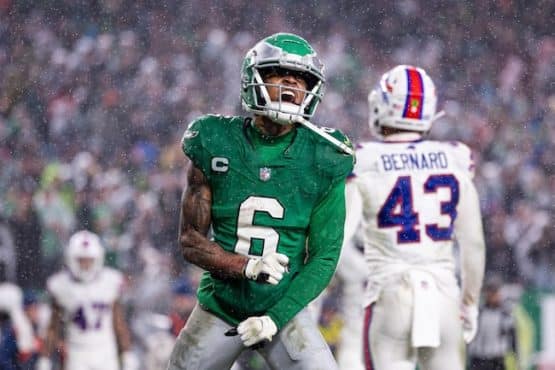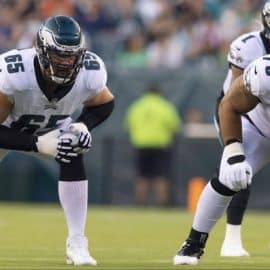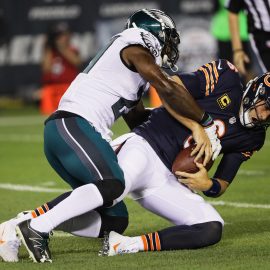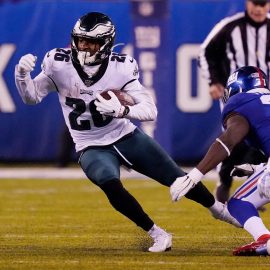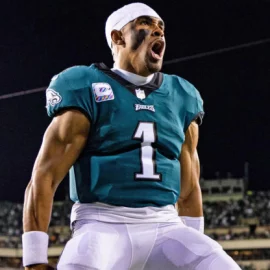I don’t get it…most NFL teams allow the media full access to their rookie minicamps. The Philly media was allowed only 15 minutes to observe the Eagles’ rookie class in progress over the weekend.
What’s the big smoke screen here about?
What are we trying to hide?
Is it a case of “Spies Everywhere!” and we don’t want the rest of the world to know just yet how potent this rookie class is?
Or is it a case of our ownership and management taking every precaution to protect our youngest lads from being over-scrutinized by a very unforgiving local media in their very first public workouts with the team?
I’m not sure.
As for me, I could care less whether a top prospect drops an easy pass or screws up a blocking assignment at this stage of the season.
What is going on with these kids in July and August is all that really matters to me.
At least there is one guy we now know who didn’t give a damn about the Invisible Cloak thrown over the Eagles’ rookie camp.
Twenty players participated in the Eagles’ Rookie Camp on a tryout basis this past weekend. One of them still has a shot to make the final roster.
On Sunday, the Eagles waived/injured quarterback Jerod Evans due to a foot injury. In his place, the Eagles signed offensive tackle Victor Salako.
A four-year starter at left tackle, the Huntsville, Alabama native began his college career at Alabama-Birmingham, where he started 23 games in his first two seasons. After UAB disbanded its football program, Salako went to Oklahoma State and started every game in both 2015 and ‘16. He was named a second-team All-Big 12 selection by the coaches this past year.
Salako’s massive frame at 6-6, 335 pounds gives the Eagles a prospect to work with at a talented and crowded position group.
Last year, the rookie minicamp was dominated by No. 2 overall pick Carson Wentz, who showed his presence within the complex pretty early (see story). Funny, but the Eagles were more than willing to showcase that group of rookies featuring Carson Wentz to the media just a year ago.
Maybe one reason we’re being so media-shy this off-season is we don’t want divisional competitors to get too much of an early look at our 3rd round pick Rasul Douglas, who unfortunately may have to get his act in gear fast enough to open up as a starting cornerback for the Eagles’ somewhat fragile defensive secondary in September.
Douglas is raw—really raw— and needs to be coached up big time—but the reason he was drafted at #99 overall is because he represents an instant potential upgrade over the likes of Jalen Mills, Ron Brooks and Patrick Robinson. So of course you don’t want video of this kid getting out there showing any kind of hiccups or confusion coming out of a daggone rookie camp.
It’s a shell game. Equally deceptive is the stupid “projections of wins for every team” that the national media is coming out with at this time of year. It’s ridiculous. They try to determine “Strength of Schedule” based upon who won what last season… and yet, they just don’t get it that it doesn’t matter whom you play in the new schedule, but WHEN…
I mean, this is just silly:
“In an Insider post for ESPN, Aaron Schatz of Football Outsiders updates 2017 win projections for every team. A part of the forecasting formula that Football Outsiders uses is strength of schedule. The Eagles, turns out, have the toughest SOS in the league. The world champion Patriots, meanwhile, have the easiest road. The NFC East in general faces an uphill climb, with the Dallas Cowboys (2),Washington Redskins (3) and New York Giants (4) all in the top five in strength of schedule.”
“The problem isn’t just these teams beating up on each other for six games — the NFC East also draws the two West divisions, which means facing many of the league’s top defenses. Right now in the NFC East, it isn’t good enough to be good. You need to be great. With an easier schedule, an NFC South or West team doesn’t have to play as well as an NFC East team to make the postseason as a wild card.”
That in my opinion is pure balderdash. You play the schedule as it falls one week at a time. Your opponent is going to have just as much a degree of difficulty as you do on a weekly basis—and what you or they did last season is irrelevant to the current field of combat.
What you strive to do is build on one game at a time and create some confidence, some momentum…even if you lose a tough game that could have been won, you move on to the next with improvement in mind—the idea is to stack some wins in bunches. That’s how you beat the theoretical “strength of schedule”… You simply outrun it.
Add The Sports Daily to your Google News Feed!

